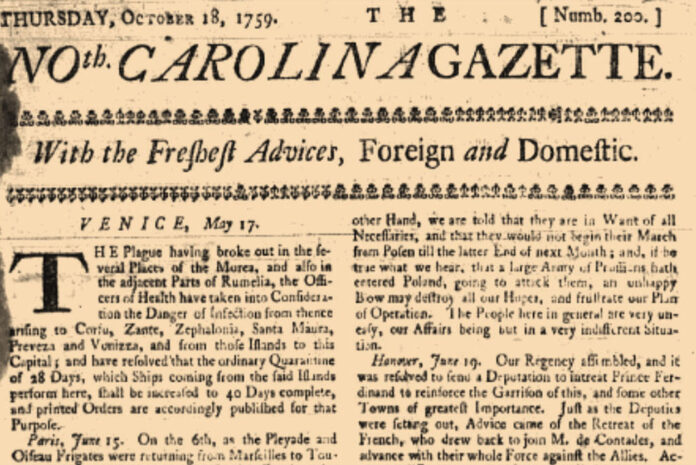by Edward Ellis, Special Correspondent
Thinking of colonial printers, one might conjure up Benjamin Franklin. Franklin was a well-known genius and the foremost printer for the colony of Pennsylvania. His contemporary of the printed word in North Carolina was James Davis.
Davis was born October 21, 1721 in Virginia where he would learn his trade. After migrating to New Bern in his twenties, he founded the North Carolina Gazette, the first newspaper in North Carolina. He printed the first book and the first pamphlet in the colony as well—and many more after that.
Davis had an illustrious career. He served as a member of the North Carolina Assembly, as county sheriff, as a judge of both the county court and the admiralty court, and as the first local postmaster. He also played a major role in persuading Governor William Tryon to confirm New Bern as the working capital of the colony.
New Bern had been in bitter competition with Wilmington as North Carolina’s center of government. In his newspaper, Davis harangued the “Terrible Horribility!” of the high prices of everything in Wilmington. Davis stated in a bold editorial that Wilmington was gloomy and dismal; that it was nothing but hot, parching sand and stagnant water. He said Wilmington was almost South Carolina and that the capital should be in a more central location. He laid it on thick.
After his move here, Tryon latched onto Davis to print the colonial assembly’s minutes, legal codes, decrees, and such. The colony’s official paper money was printed by Davis under gubernatorial sanction. But when Davis turned on the crown at the time of the American Revolution, he went full out and never looked back. He was boisterous and bombastic in his printed rhetoric. He joined other Patriots on the Committees of Safety for Craven County and the Town of New Bern
By the time of his death in February 1785 – 238 years ago this month – Davis had become wealthy and owned land all over the county. The colonial printer is buried at Christ Episcopal Church on Pollock Steet, just down the lane from the location of his printing office.


